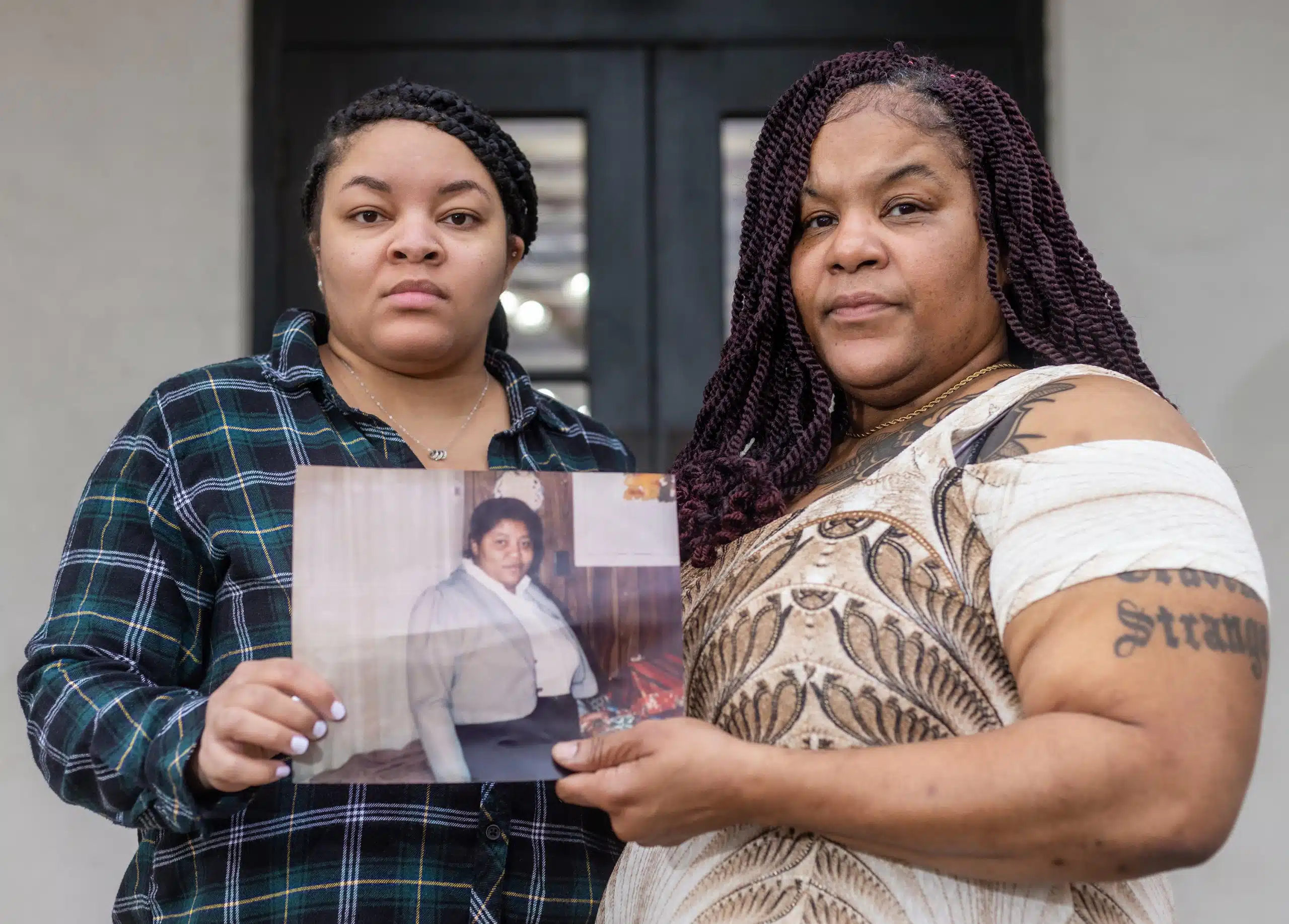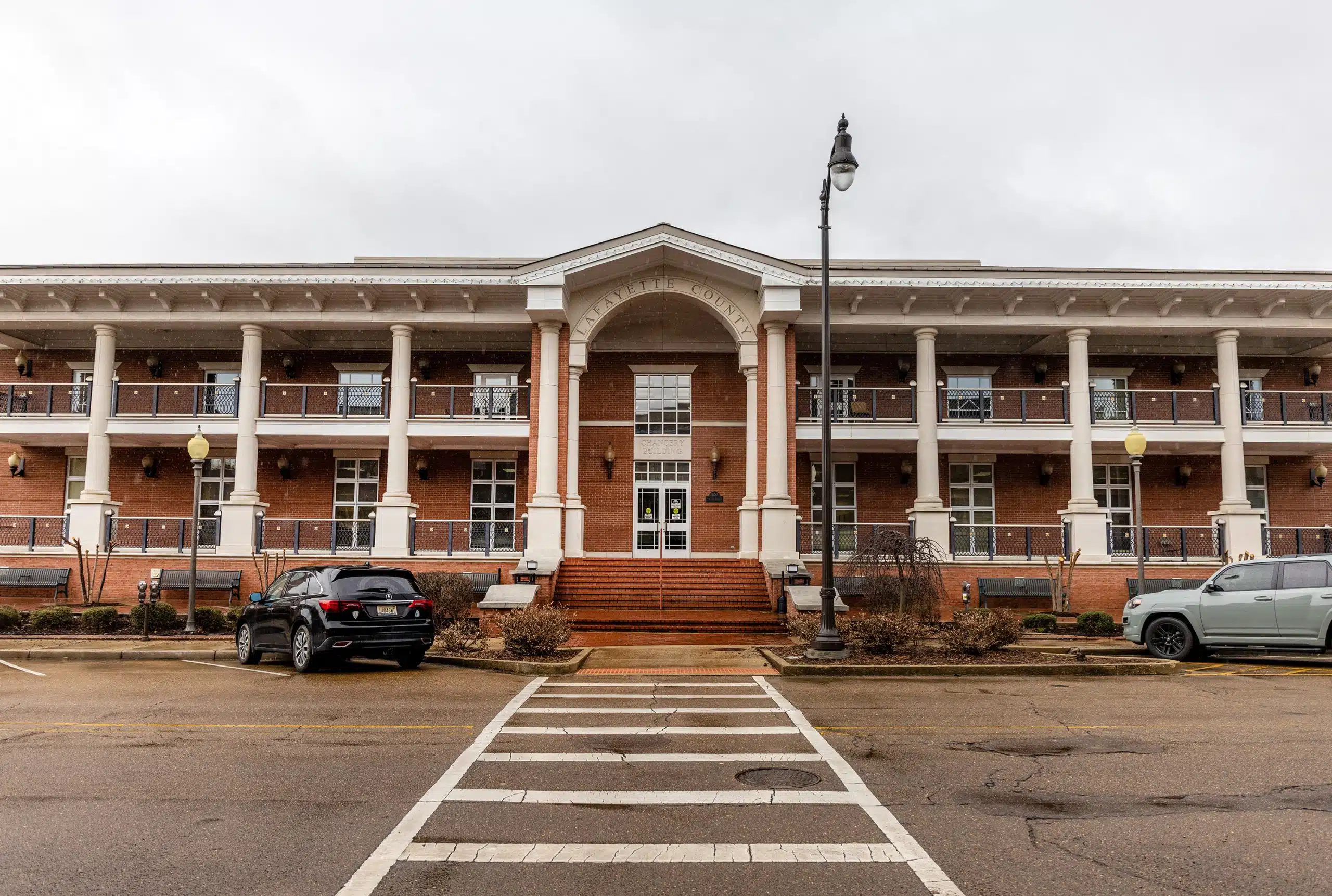Mississippi Today
Mississippi remains an outlier in jailing people with serious mental illness without charges
This article contains descriptions of threats of violence and mental illness. If you or someone you know needs help:
- Call the National Suicide Prevention Lifeline: 988
- Text the Crisis Text Line from anywhere in the U.S. to reach a crisis counselor: 741741
This article was produced for ProPublica’s Local Reporting Network in partnership with Mississippi Today. Sign up for Dispatches to get stories like this one as soon as they are published.
Nearly 40 years ago, a federal appeals court ruled that Alabama officials could not jail people in mental health crisis who were sent to the state for help. Jailing people going through the state’s civil commitment process, the court decided, amounted to punishment. And about 30 years ago, after Kentucky was labeled the worst state in the nation for jailing mentally ill people without charges, legislators there banned it.
But a new survey of counties and an analysis of jail dockets in Mississippi, which has no such law, has found that people going through the civil commitment process for mental illness are regularly jailed as they await evaluation and treatment, even when they haven’t been charged with a crime. Some counties routinely hold such people in jail — people awaiting treatment for mental illness or substance abuse were held in jail without charges at least 2,000 times from 2019 to 2022 in 19 counties alone, sometimes for days or weeks.
Nationally, Mississippi is a stark outlier. Mississippi Today and ProPublica conducted a nationwide survey of disability advocacy organizations and state agencies that oversee behavioral health. None described anything close to the scale of what’s happening in Mississippi.
Civil commitment laws are meant to ensure people get treatment even when they don’t recognize that they need it, said James Tucker, an attorney and the director of the Alabama Disabilities Advocacy Program. Locking them up as they wait for a treatment bed doesn’t fulfill that goal.
“The bargain for your lack of freedom is that the state has decided you need treatment,” he said. “The minute that order is entered, the state has a constitutional duty to deliver treatment.”
At least 12 states plus the District of Columbia prohibit jailing people undergoing commitment proceedings for mental illness unless they have been charged with a crime.
Mississippi law, however, allows people going through the civil commitment process to be sent to jail if there is “no reasonable alternative.” If there are no publicly funded beds in appropriate facilities, local officials sometimes decide they have no other option.
“We Forbid the Use of Jails”
In the 1970s, a federal class-action lawsuit against Alabama officials alleged that it was unconstitutional to jail people going through the commitment process for mental illness while they awaited hearings. It was common at the time: Probate judges in three-quarters of the state’s counties had jailed people, according to discovery findings cited in a court ruling.
Lawyers for the plaintiffs — everyone in the state who had been committed or would be in the future — cited previous lawsuits that had uncovered fire hazards, overcrowding and a dearth of mental health and routine medical care in Alabama’s county jails.
The district court ruled against the plaintiffs’ constitutional claims, reasoning that if the local jail was the only option in a county, it was the least restrictive facility that would also protect society.
“The bargain for your lack of freedom is that the state has decided you need treatment. The minute that order is entered, the state has a constitutional duty to deliver treatment.”
James Tucker, director of the Alabama Disabilities Advocacy Program
But in 1984, a panel of judges on the 11th U.S. Circuit Court of Appeals rejected that reasoning. Circuit Judge Thomas Alonzo Clark wrote in his opinion that nothing prevented counties from placing people in a public facility in another county or in a local private facility that was equipped to handle mentally ill patients.
Clark cited a doctor’s testimony that jail often worsened psychosis, made it harder to treat people and increased suicidal tendencies.
“We forbid the use of jails for the purpose of detaining persons awaiting involuntary civil commitment proceedings, finding that to do so violates those persons’ substantive and procedural due process rights,” the judge wrote.
The reasons that Alabama officials provided for placing people in jail were similar to Mississippi officials’ arguments today. But Mississippi is in a different federal circuit, and the practice there has not been tested with a class-action lawsuit.
A sister of one woman who had died in a Mississippi jail in 1987 tried and failed to convince a federal judge that the woman’s rights had been violated when she was incarcerated without treatment.

Mae Evelyn Boston, an Oxford woman who had dealt with paranoid schizophrenia for most of her adult life, had a psychotic episode shortly after giving birth. Her older daughter, Everlean, was 12 years old; she remembers her mother saying she was going to kill the baby because the girl “had a demon in her.”
One of Boston’s sisters initiated commitment proceedings — making Boston one of more than 100 people jailed for that reason from 1984 to 1988 in Lafayette County, according to a deposition cited in a 1990 ruling by U.S. District Judge Neal Biggers. When deputies arrived to take her mother into custody for evaluation, Everlean recalled, it took six of them to get her onto the ground before handcuffing her and placing her in the back of a cop car.
Once Boston was in jail, guards did not complete a medical screening required by department policy and didn’t know Boston had given birth via cesarean section 12 days before, Biggers wrote. She died two days later from heart failure caused by blood clots.
Everlean Boston remembers her mother smoking cigarettes and listening to the blues on quiet Sundays at home. The day deputies took her mother away was the last time she saw her. “I never got to say goodbye,” she recalled. “I never got to say I loved her. It hurts.”
“I never got to say goodbye. I never got to say I loved her. It hurts.”
Everlean Boston, whose mother, Mae Evelyn Boston, died in jail as she went through the civil commitment process
Biggers concluded that the “medical care customarily provided by the county for mentally ill detainees does not fall below constitutional standards” and that what happened with Boston represented a “scheduling error” and an “isolated instance.” The county, which argued it had provided adequate care for Boston, had the right to detain people like her “in the interest of societal safety,” he found, and those people were not entitled to placement in the “least restrictive alternative” such as a hospital. Biggers considered the Alabama appeals court ruling from a few years earlier, but concluded it didn’t apply because it was based on specific facts about that state’s jails.
“The court declines to hold that use of jails for temporary detention of persons awaiting civil commitment proceedings is unconstitutional per se,” Biggers ruled.
Since then, at least nine lawsuits have been filed over the deaths of Mississippians incarcerated during civil commitment proceedings. None of those lawsuits directly challenged the constitutionality of being jailed during the commitment process. The U.S. Supreme Court has not ruled on the matter, academics and attorneys with expertise in civil commitment said.
In the years after Boston’s death, Mississippi continued to stand out.

In 1992, the National Alliance for the Mentally Ill and Public Citizen’s Health Research Group conducted a national survey about the practice of jailing mentally ill people.
Almost a third of city and county jails in Mississippi responded. About 76% of respondents said they detained people who had not been charged with a crime and were awaiting an evaluation, treatment or hospitalization for mental illness. That was the second-highest percentage of any state in the country and far higher than the national average of 29%.
An unnamed Mississippi jail official said in the organizations’ report that jails were a “dumping ground for what nobody else wants.”
The report gave its “Worst State Award” to Kentucky, where 81% of responding jails reported holding people without criminal charges for mental evaluations.
Two years later, Kentucky’s legislature voted unanimously to ban the practice. The state health agency and its federally designated disability rights organization told Mississippi Today and ProPublica that Kentucky jails today are not used to hold people without charges awaiting mental health evaluations.
Few States Compare to Mississippi
Officials with the Mississippi Department of Mental Health emphasize that they do not support the practice of jailing people during the commitment process. But a spokesperson said they “have heard anecdotally from other states regarding challenges of individuals waiting in jail.”
Nationally, even basic data like the number of people committed each year is elusive. After reviewing some of Mississippi Today and ProPublica’s findings, the Treatment Advocacy Center, a national nonprofit that advocates making it easier for people with mental illness to get treatment, started planning a project to understand how often people are jailed without charges during the commitment process across the U.S.
Mississippi Today and ProPublica contacted agencies overseeing mental health and disability advocacy organizations in every state to find out whether Mississippi is an outlier. It is.
Respondents in 42 states and the District of Columbia said they were not aware of people being regularly held in jail without charges during the psychiatric civil commitment process. In a handful of those states, respondents said they had seen it once or twice over the years.
In two states, people can be sent from state psychiatric hospitals to mental health units inside prisons. In a few others, respondents said they had seen people jailed for noncompliance with court-ordered treatment for mental illness or substance abuse.
Respondents in three other states — Alaska, South Dakota and Wyoming — reported that people sometimes are sent to jail to await psychiatric evaluations, but the information they provided suggested that it happens to fewer people, and for a shorter period, than in Mississippi.
In 2018, staffing shortages at the Alaska Psychiatric Institute caused people to be held at the Anchorage Correctional Complex until they could be evaluated. The next year, an Anchorage judge ordered an end to the practice except in the “rarest circumstances,” finding that it had caused “irreparable harm.”
A subsequent settlement declared that jails shouldn’t be used unless no other option was available and that such detentions should be as short as possible.
But detentions do still occasionally happen in the state when people in rural areas await transportation to an evaluation center, said Mark Regan, legal director at the Disability Law Center of Alaska. According to the Alaska Department of Family and Community Services, people awaiting evaluation were held in jail 555 times from mid-2018 through late February 2023.
Across South Dakota, people without charges sometimes have been held in jail during the commitment process, according to law enforcement agencies and Disability Rights South Dakota, but such holds are limited by law to 24 hours; in Mississippi, the vast majority of cases analyzed were for more than 24 hours. The South Dakota Department of Social Services said it doesn’t track how often it happens and declined to answer questions.
And in Wyoming, a person can be held in jail for up to 72 hours on an emergency basis before a hearing, but they must have a mental examination within 24 hours. Such holds in jail have occurred “in very rare circumstances,” according to the state.
Attempts to constrain the use of jails date back at least to 1950, when the federal government sent governors model legislation that limited the incarceration of people for mental illness to “extreme emergency” situations. The National Institute of Mental Health called incarcerating such people “among the worst of current practices.”
Some states adopted the legislation. Mississippi did not.
This article first appeared on Mississippi Today and is republished here under a Creative Commons license.
Mississippi Today
Hospitals see danger in Medicaid spending cuts
Mississippi hospitals could lose up to $1 billion over the next decade under the sweeping, multitrillion-dollar tax and policy bill President Donald Trump signed into law last week, according to leaders at the Mississippi Hospital Association.
The leaders say the cuts could force some already-struggling rural hospitals to reduce services or close their doors.
The law includes the largest reduction in federal health and social safety net programs in history. It passed 218-214, with all Democrats voting against the measure and all but five Republicans voting for it.
In the short term, these cuts will make health care less accessible to poor Mississippians by making the eligibility requirements for Medicaid insurance stiffer, likely increasing people’s medical debt.
In the long run, the cuts could lead to worsening chronic health conditions such as diabetes and obesity for which Mississippi already leads the nation, and making private insurance more expensive for many people, experts say.
“We’ve got about a billion dollars that are potentially hanging in the balance over the next 10 years,” Mississippi Hospital Association President Richard Roberson said Wednesday during a panel discussion at his organization’s headquarters.
“If folks were being honest, the entire system depends on those rural hospitals,” he said.
Mississippi’s uninsured population could increase by 160,000 people as a combined result of the new law and the expiration of Biden-era enhanced subsidies that made marketplace insurance affordable – and which Trump is not expected to renew – according to KFF, a health policy research group.
That could make things even worse for those who are left on the marketplace plans.
“Younger, healthier people are going to leave the risk pool, and that’s going to mean it’s more expensive to insure the patients that remain,” said Lucy Dagneau, senior director of state and local campaigns at the American Cancer Society.
Among the biggest changes facing Medicaid-eligible patients are stiffer eligibility requirements, including proof of work. The new law requires able-bodied adults ages 19 to 64 to work, do community service or attend an educational program at least 80 hours a month to qualify for, or keep, Medicaid coverage and federal food aid.
Opponents say qualified recipients could be stripped of benefits if they lose a job or fail to complete paperwork attesting to their time commitment.
Georgia became the case study for work requirements with a program called Pathways to Coverage, which was touted as a conservative alternative to Medicaid expansion.
Ironically, the 54-year-old mechanic chosen by Georgia Gov. Brian Kemp to be the face of the program got so fed up with the work requirements he went from praising the program on television to saying “I’m done with it” after his benefits were allegedly cancelled twice due to red tape.
Roberson sent several letters to Mississippi’s congressional members in weeks leading up to the final vote on the sweeping federal legislation, sounding the alarm on what it would mean for hospitals and patients.
Among Roberson’s chief concerns is a change in the mechanism called state directed payments, which allows states to beef up Medicaid reimbursement rates – typically the lowest among insurance payors. The new law will reduce those enhanced rates to nearly as low as the Medicare rate, costing the state at least $500 million and putting rural hospitals in a bind, Roberson told Mississippi Today.
That change will happen over 10 years starting in 2028. That, in conjunction with the new law’s one-time payment program called the Rural Health Care Fund, means if the next few years look normal, it doesn’t mean Mississippi is safe, stakeholders warn.
“We’re going to have a sort of deceiving situation in Mississippi where we look a little flush with cash with the rural fund and the state directed payments in 2027 and 2028, and then all of a sudden our state directed payments start going down and that fund ends and then we’re going to start dipping,” said Leah Rupp Smith, vice president for policy and advocacy at the Mississippi Hospital Association.

Even with that buffer time, immediate changes are on the horizon for health care in Mississippi because of fear and uncertainty around ever-changing rules.
“Hospitals can’t budget when we have these one-off programs that start and stop and the rules change – and there’s a cost to administering a program like this,” Smith said.
Since hospitals are major employers – and they also provide a sense of safety for incoming businesses – their closure, especially in rural areas, affects not just patients but local economies and communities.
U.S. Rep. Bennie Thompson is the only Democrat in Mississippi’s congressional delegation. He voted against the bill, while the state’s two Republican senators and three Republican House members voted for it. Thompson said in a statement that the new law does not bode well for the Delta, one of the poorest regions in the U.S.
“For my district, this means closed hospitals, nursing homes, families struggling to afford groceries, and educational opportunities deferred,” Thompson said. “Republicans’ priorities are very simple: tax cuts for (the) wealthy and nothing for the people who make this country work.”
While still colloquially referred to as the One Big Beautiful Bill Act, the name was changed by Democrats invoking a maneuver that has been used by lawmakers in both chambers to oppose a bill on principle.
“Democrats are forcing Republicans to delete their farcical bill name,” Senate Democratic Leader Charles Schumer of New York said in a statement. “Nothing about this bill is beautiful — it’s a betrayal to American families and it’s undeserving of such a stupid name.”
The law is expected to add at least $3.3 trillion to the nation’s debt over the next 10 years, according to the most recent estimate from the Congressional Budget Office.
This article first appeared on Mississippi Today and is republished here under a Creative Commons Attribution-NoDerivatives 4.0 International License.
The post Hospitals see danger in Medicaid spending cuts appeared first on mississippitoday.org
Note: The following A.I. based commentary is not part of the original article, reproduced above, but is offered in the hopes that it will promote greater media literacy and critical thinking, by making any potential bias more visible to the reader –Staff Editor.
Political Bias Rating: Center-Left
This article reports on the negative impacts of a major federal tax and policy bill on Medicaid funding and rural hospitals in Mississippi. While it presents factual details and statements from stakeholders, the tone and framing emphasize the harmful consequences for vulnerable populations and health care access, aligning with concerns typically raised by center-left perspectives. The article highlights opposition by Democrats and critiques the bill’s priorities, particularly its effect on poor and rural communities, suggesting sympathy toward social safety net preservation. However, it maintains mostly factual reporting without overt partisan language, resulting in a moderate center-left bias.
Crooked Letter Sports Podcast
Podcast: The Mississippi Sports Hall of Fame Class of ’25
The MSHOF will induct eight new members on Aug 2. Rick Cleveland has covered them all and he and son Tyler talk about what makes them all special.
Stream all episodes here.
This article first appeared on Mississippi Today and is republished here under a Creative Commons Attribution-NoDerivatives 4.0 International License.
The post Podcast: The Mississippi Sports Hall of Fame Class of '25 appeared first on mississippitoday.org
Mississippi Today
‘You’re not going to be able to do that anymore’: Jackson police chief visits food kitchen to discuss new public sleeping, panhandling laws
Diners turned watchful eyes to the stage as Jackson Police Chief Joseph Wade took to the podium. He visited Stewpot Community Services during its daily free lunch hour Thursday to discuss new state laws, which took effect two days earlier, targeting Mississippians experiencing homelessness.
“I understand that you are going through some hard times right now. That’s why I’m here,” Wade said to the crowd. “I felt it was important to come out here and speak with you directly.”
Wade laid out the three bills that passed earlier this year: House Bill 1197, the “Safe Solicitation Act,” HB 1200, the “Real Property Owners Protection Act” and HB 1203, a bill that prohibits camping on public property.
“Sleeping and laying in public places, you’re not going to be able to do that anymore,” he said. “There’s a law that has been passed that you can’t just set up encampments on public or private properties where it’s a public nuisance, it’s a problem.”
The “Real Property Owners Protection Act,” authored by Rep. Brent Powell, R-Brandon, is a bill that expedites the process of removing squatters. The “Safe Solicitation Act,” authored by Rep. Shanda Yates, I-Jackson, requires a permit for panhandling and allows people to be charged with a misdemeanor if they violate this law. The offense is punishable by a fine not to exceed $300 and an offender could face up to six months in jail. Wade said he’s currently working with his legal department to determine the best strategy for creating and issuing permits.
“We’re going to navigate these legal challenges, get some interpretations, not only from our legal department, but the Attorney General’s office to ensure that we are doing it legally and lawfully, because I understand that these are citizens,” he said. “I understand that they deserve to be treated with respect, and I understand that we are going to do this without violating their constitutional rights.”
Wade said the Jackson Police Department is steadily fielding reports of squatters in abandoned properties and the law change gives officers new power to remove them more quickly. The added challenge? Figuring out what to do with a person’s belongings.
“These people are carrying around what they own, but we are not a repository for all of their stuff,” he said. “So, when we make that arrest, we’ve got to have a strategic plan as to what we do with their stuff.”
Wade said there needs to be a deeper conversation around the issues that lead someone to becoming homeless.
“A lot of people that we’re running across that are homeless are also suffering from medical conditions, mental health issues, and they’re also suffering from drug addiction and substance abuse. We’ve got to have a strategic approach, but we also can’t log jam our jail down in Raymond,” Wade said.
He estimates that more than 800 people are currently incarcerated at the Raymond Detention Center, and any increase could strain the system as the laws continue to be enforced.
“I think there’s layers that we have to work through, there’s hurdles that we are going to overcome, but we’ve got to make sure that we do it and make sure that my team and JPD is consistent in how we enforce these laws,” Wade said.
Diners applauded Wade after he spoke, in between bites of fried chicken, salad, corn and 4th of July-themed packaged cakes. Wade offered to answer questions, but no one asked any.
Rev. Jill Buckley, executive director of Stewpot, said that the legislation is a good tool to address issues around homelessness and community needs. She doesn’t want to see people who are homeless be criminalized, but she also wants communities to be safe.
“I support people’s right to self determine, and we can’t impose our choices on other people, but there are some cases in which that impinges on community safety, and so to the extent that anyone who is camping or panhandling or squatting and is a danger to themselves and others, of course, I fully support that kind of law. I don’t support homelessness being criminalized as such,” Buckley said.

Many of the people Wade addressed while they ate Thursday said they have housing, don’t panhandle, and shouldn’t be directly impacted by the legislation. But Marcus Willis, 42, said it would make more sense if elected officials wanted to combat the negative impacts of homelessness that they help more people secure employment.
“There ain’t enough jobs,” said Willis, who was having lunch with his girlfriend Amber Ivy.
The two live in an apartment together nearby on Capitol Street, where Ivy landed after her mother, whom Ivy had been living with, suffered a stroke and lost the property. Similarly, Willis started coming to eat at Stewpot after his grandmother, whose house he used to visit for lunch, passed away.
Willis holds odd jobs – cutting grass, home and auto repair – so the income is inconsistent, and every opportunity for stable employment he said he’s found is outside of Jackson in the suburbs. The couple doesn’t have a car.
Making rent every month usually depends on their ability to find someone to help chip in, said Ivy, who is in recovery from substance abuse. She said she’s watched problems surrounding homelessness grow over the years in Jackson. Ivy grew up near Stewpot and has lived in various neighborhoods across the city – except for the times she moved out of state when things got too rough.
“There was just moments where I just had to leave,” Ivy said. “Sometimes if you hit a slump here, there’s almost no way for you to get out of it.”
This article first appeared on Mississippi Today and is republished here under a Creative Commons Attribution-NoDerivatives 4.0 International License.
The post 'You're not going to be able to do that anymore': Jackson police chief visits food kitchen to discuss new public sleeping, panhandling laws appeared first on mississippitoday.org
Note: The following A.I. based commentary is not part of the original article, reproduced above, but is offered in the hopes that it will promote greater media literacy and critical thinking, by making any potential bias more visible to the reader –Staff Editor.
Political Bias Rating: Center-Right
This article primarily reports on new laws in Jackson, Mississippi, targeting public sleeping, panhandling, and squatting, focusing on statements by Police Chief Joseph Wade and community perspectives. The coverage presents the legislative measures—authored by Republican and independent lawmakers—with a tone that emphasizes law enforcement challenges and community safety, reflecting a conservative approach to homelessness as a public order issue. While it includes voices concerned about criminalization and the need for social support, the overall framing centers on law enforcement and property protection. The article maintains factual reporting without overt editorializing but leans slightly toward a center-right perspective by highlighting legal enforcement as a solution.
-
News from the South - Arkansas News Feed7 days ago
Real-life Uncle Sam's descendants live in Arkansas
-
News from the South - Georgia News Feed6 days ago
'Big Beautiful Bill' already felt at Georgia state parks | FOX 5 News
-
News from the South - Oklahoma News Feed6 days ago
LOFT report uncovers what led to multi-million dollar budget shortfall
-
The Center Square4 days ago
Here are the violent criminals Judge Murphy tried to block from deportation | Massachusetts
-
Local News6 days ago
Maroon Tide football duo commits to two different SEC Teams!
-
The Center Square6 days ago
Alcohol limits at odds in upcoming dietary guidelines | National
-
Mississippi News Video7 days ago
Today’s First Alert Weather Kid is Ashlyn (7/4)
-
News from the South - South Carolina News Feed7 days ago
South Carolina lawmakers react as House approves Trump’s sweeping economic package

















































